3rd November 2021, Lancaster Castle
This workshop, focused on redress and support for victims of child abusive images (CAI), brought together experts who work with CAI victims and academic researchers. During the workshop, practitioners and academics (1) shared ideas on financial reparation and tailored counselling for CAI victims and (2) considered the dilemma of unknowing CAI victims who may remain unaware of the dissemination (and even existence) of the CAI that they feature in.
The morning speaker session featured academics and a victim who spoke on the the issue of unknowing victims. Workshop participants then worked in groups, using vignettes featuring situations involving hypothetical CAI victims. They were encouraged to apply their own experiences to shape ideas of what an ‘unknowing victims toolkit’ would need to include, and foresee any particular practical challenges.
In the afternoon session, the speakers discussed the subject of the harms caused to CAI victims and what reparation is currently available for victims. Working in small groups, participants then explored what was currently missing from reparation on offer and how a model of restorative justice could be adaptable to the individual facts for each case, and identified and discuss common fact patterns.
Workshop outcomes
The project researchers are now working on the data gathered during the small group sessions, which will be used to create a prototype toolkit to assist law enforcement officers in their interactions with victims who may be unknowing victims of CAI offences. This will be presented at the final project workshop in 2023.






 Suzanne Ost and Monique Mehmi gave a presentation on the project at the Socio-Legal Studies Association conference, University of York, on 7th April 2022: ‘Responding to Unknowing Victims of Child Abusive Images’.
Suzanne Ost and Monique Mehmi gave a presentation on the project at the Socio-Legal Studies Association conference, University of York, on 7th April 2022: ‘Responding to Unknowing Victims of Child Abusive Images’. 